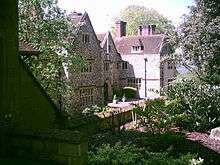Police Rehabilitation Centre, Flint House
 Flint House, Goring-on-Thames, Oxfordshire | |
| Founded at | Goring-on-Thames |
|---|---|
| Services | individually planned, intensive, rehabilitation services for sick and injured, serving and retired police officers |
Chief Executive | Tom McAuslin |
Deputy Chief Executive | David Flint |
| David Ball, Mark Nuthern, Jayne Willets, Ken Marsh, Mark White, Peter Sudbury, Andrew Menzies, Rhys Hamilton, Simon Bray, Clive Field, Tim Jackson | |
Budget |
|
| Website | http://www.flinthouse.co.uk/ |
Formerly called |
|
The Police Rehabilitation Centre, Flint House is a rehabilitation centre for serving and retired police officers in England & Wales. The centre's mission is "to provide the highest standards of individually planned, intensive, rehabilitation services for sick and injured, serving and retired police officers".
History
The house and surrounding 14 acre estate were purchased by the Police Convalescent Home Management Committee on 20 April 1985 after the previous centre, Kingsway, was deemed to be too small. After renovation works, Flint House was opened as a Police Rehabilitation Centre by Queen Elizabeth the Queen Mother on 2 June 1988.[1] The house had previously been a training centre for the Water Industry Training Board, and later Thames Water, complete with a complex system of pipes for trainees to detect leaks.[1]
The centre is in Goring-on-Thames, and has 158 CQC-regulated bedrooms, split across two separate buildings - the original Flint House building, and the Flint Fold annexe, which was opened in 2003.[1] By 2010, the centre had treated more than 30,000 officers, about 40% of whom had been injured on duty, with the remainder being treated for what the centre called “accumulated wear and tear”.[2] In 2014, the centre treated over 3,800 serving or retired police officers with their staff of 149.[3]
The centre has historically been busy - in 2010, the waiting list had increased from two weeks to six weeks, and had obtained planning permission for a further 125-bed extension which was planned to cost £5m.[4]
In 2010, the first Chief Executive of the centre, Lyndon Filer, was awarded an MBE for his services to the police with the centre, which he helped set up, becoming the first administrator of the centre, and then, in 2000, the first Chief Executive.[2][5]
Services
In 2010, the centre had 14 full-time physiotherapists on site, leading various spinal mobility lessons and lower-limb strengthening classes.[4] About 80% of attending officers receive physiotherapy treatment.[6] 10-15% of the residents at the time suffered from stress, depression, anxiety, or PTSD.[4] There are also other treatments, including physiotherapy, hydrotherapy, stress counselling, general nursing care, health classes and sleep relaxation.[7] The average length of stay after initial admission is 12 days.[2] There are 153 bedrooms in total, 71 in the annexe opened in 2004 - Flint Fold, and 83 in Flint House.[8]
The centre has a licensed bar, which runs occasional quiz evenings, and has several lounges with small libraries to allow patients to relax. It also has 24-hour free tea and coffee. Games include pool, snooker and billiards, whereas outside there are bowls, a chipping green, boules pit, and a golf driving net, as well as a woodland outdoor fitness trail.[9]
Funding
The centre costs approximately £4m each year to run, and is funded almost entirely by regular donations from 67,000 police officers.[4] It does not solicit donations from the public. However, there are sometimes other sources of income; since 2009, the Home Office provided £1.6m in grants in order to improve accessibility, and to refurbish the dining room.[10]
References
- 1 2 3 A Brief History of Flint House (PDF). The Police Rehabilitation Centre, Flint House. 2015.
- 1 2 3 "Seven to receive awards from Queen". www.henleystandard.co.uk. Henley Standard. 2010-01-11. Retrieved 2016-03-14.
- ↑ "Charity Overview - THE POLICE REHABILITATION CENTRE". Charity Commission. Retrieved 2016-03-14.
- 1 2 3 4 "The house that mends coppers: A haven for injured police". The Independent. Retrieved 2016-03-14.
- ↑ "MBE for ex-Gwent man'w work with police rehab unit". South Wales Argus. Retrieved 2016-03-14.
- ↑ "The Police Rehabilitation Centre 'Flint House'" (PDF). The Police Rehabilitation Centre. Retrieved 2016-03-14.
- ↑ "Treatment Modalities". www.flinthouse.co.uk. The Police Rehabilitation Centre. Retrieved 2016-03-14.
- ↑ User, Super. "Welcome to Flint House | Home". www.flinthouse.co.uk. Retrieved 2016-09-01.
- ↑ "Relaxation". www.flinthouse.co.uk. The Police Rehabilitation Centre. Retrieved 2016-03-14.
- ↑ "Charity seeking memories of 100-year-old premises". www.henleystandard.co.uk. Henley Standard. 2013-03-18. Retrieved 2016-03-14.